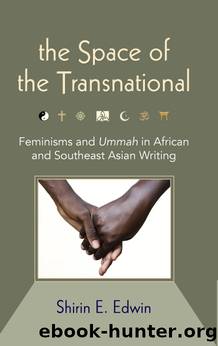The Space of the Transnational by Shirin E. Edwin

Author:Shirin E. Edwin [Edwin, Shirin E.]
Language: eng
Format: epub
Tags: Social Science, Feminism & Feminist Theory, Literary Criticism, African
ISBN: 9781438486406
Google: aTwpEAAAQBAJ
Publisher: SUNY Press
Published: 2021-12-01T05:29:07+00:00
Interreligious Windows and Marriage in Abubakar Gimbaâs Sacred Apples
Abubakar Gimbaâs novel Sacred Apples (1997) is feminist in its purpose, as he dedicates it to womenâto mothers, wives, âwomankind,â and âwomanhood.â The novel maps a womanâs journey from psychological dependence on male guardianship in marriage to gendered self-determination in the figure of Zahrah. Zahrah divorces her overbearing husband Yazid for adultery and moves out of his home with their two children. Penniless and clueless about her future as she lived in Yazidâs shadow, Zahrah quickly emerges from a state of psychological dependence on men to discover her own abilities. This is facilitated by Miriam, a Roman Catholic friend who is married to a Muslim (67). Over the course of the story, the Christian woman becomes âlike her sisterâ (70). The conversations with Miriam serve as models for community that develop within national borders across geographies of religion. Zahrah actively claims this community with Miriam to understand her own stance on gender and society. As a result of this community, Miriam âhad become Zahrahâs role model as a woman: intelligent, assertive, and having a careerâ (66). Thus, Miriamâs abetment of Zahrahâs consciousness as an independent woman twins the novelâs dedication to women and gendered self-determination as a statement on pluralism within Nigeria. This strong sense of communion and community with a Christian woman makes a double statement about the nation space that must be equitable on both religious and gendered grounds. Gimbaâs novel unambiguously exemplifies the idea that equitable and inclusive transnational organizing must proceed from this stance. Equally, solidarity, as seen in Miriamâs and Zahrahâs community, develops transgeographically across religions and genders first within national spaces. Furthermore, aesthetically, the novelâs narrative on gendered consciousness unfolds as a dialogue, a multireligious exchange that illustrates Zahrahâs gender consciousness. Like Baâs narrative that unravels in tandem with the transformation of the newly independent nation-state, Zahrahâs journey of gender consciousness is traced on pluralism. In other words, the route to gendered consciousness is essentially through an understanding of other religions. Thus Gimbaâs presents Zahrahâs psychological transformation as an exchange with Miriam.
A long series of conversations on gendered roles, rights, and responsibilities spurs Zahrahâs gendered consciousness. She gradually revises her thinking about entrenched gendered roles after several conversations on gendered identity and roles. Zahrah feels light in spirit, much happier, stronger, and âmore confident in herselfâ (86). Zahrah first encounters independence through Miriamâs reference to the custom in Islam of taking the husbandâs name upon marriage. Miriam tells Zahrah that her Muslim husband suggested that she should âretain my fatherâs name, and remain Miriam George. I thought he was up to something mischievous, till he showed me the place in your Book where it says, Call them by their fatherâs nameâ (67). Zahrah compares this provision in Islam with her former spouseâs unwillingness to let Zahrah keep her maiden name to expose the gap between religious decree with individual practice. The longest exchange deals with the conjugal contract as the first step toward an equitable community.
Download
This site does not store any files on its server. We only index and link to content provided by other sites. Please contact the content providers to delete copyright contents if any and email us, we'll remove relevant links or contents immediately.
The Power of Myth by Joseph Campbell & Bill Moyers(1049)
Half Moon Bay by Jonathan Kellerman & Jesse Kellerman(979)
Inseparable by Emma Donoghue(976)
A Social History of the Media by Peter Burke & Peter Burke(968)
The Nets of Modernism: Henry James, Virginia Woolf, James Joyce, and Sigmund Freud by Maud Ellmann(890)
The Spike by Mark Humphries;(805)
The Complete Correspondence 1928-1940 by Theodor W. Adorno & Walter Benjamin(773)
A Theory of Narrative Drawing by Simon Grennan(773)
Culture by Terry Eagleton(770)
Ideology by Eagleton Terry;(731)
World Philology by(711)
Farnsworth's Classical English Rhetoric by Ward Farnsworth(710)
Bodies from the Library 3 by Tony Medawar(707)
Game of Thrones and Philosophy by William Irwin(705)
High Albania by M. Edith Durham(697)
Adam Smith by Jonathan Conlin(685)
A Reader’s Companion to J. D. Salinger’s The Catcher in the Rye by Peter Beidler(675)
Comic Genius: Portraits of Funny People by(648)
Monkey King by Wu Cheng'en(644)
